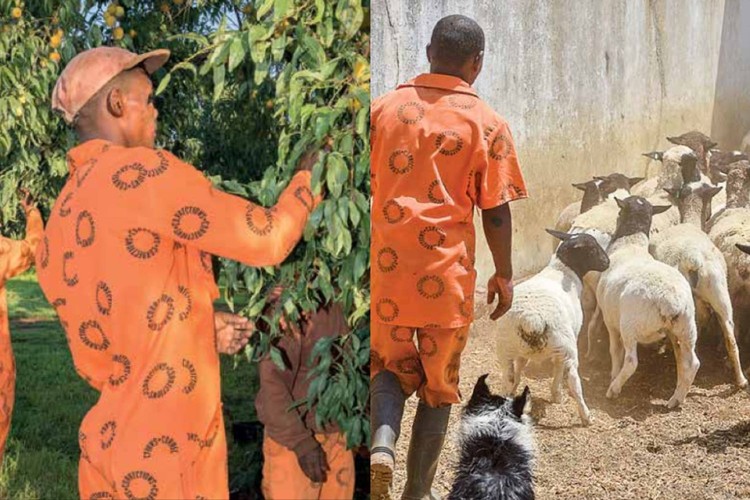Not enough prisoners have access to work and training opportunities
People earn less than R250 a month working in prison workshops or farms
South African prisons offer various work opportunities for inmates, including agriculture, but not enough prisoners are able to access them. Photos from the Department of Correctional Service’s agriculture brochure.
Work and skills training opportunities are crucial to rehabilitation, but fewer than 7% of sentenced inmates in South Africa’s prisons access them. There are also concerns that the pay rate is too low.
Programmes on offer include agriculture, both livestock and vegetables, and production workshops like cabinet making, upholstery, baking, and garment making.
These programmes help to rehabilitate inmates and “contribute to safer, less violent correctional centres,” says Sohela Surajpal, law clerk and researcher at the Judicial Inspectorate for Correctional Services (JICS).
But most prisoners do not access these programmes. Last year, 4,004 inmates participated in farming and 2,729 in production workshops, says Singabakho Nxumalo, spokesperson for the Department of Correctional Services.
This is less than 7% of the 104,117 sentenced prisoners in South Africa. And the country’s more than 61,500 awaiting trial prisoners do not access work opportunities.
Across the country’s more than 240 correctional facilities, there are 40 medium-to-large farms and 115 small vegetable gardens, said Nxumalo.
Prisoners we spoke to say they earn no more than R250 a month working at prison farms or in workshops, even if they work every day. At Atteridgeville Gender Responsive Centre, where workers reported earning less than R150 a month, the payment is “barely enough to buy essentials at the centre’s shop,” wrote Inspecting Judge for Correctional Services Edwin Cameron in a report on the facility last year.
Cameron recommended that the gratuity amount be increased.
Nxumalo confirmed that prisoners are paid between R2 and R9 a day, after being increased this year in line with inflation. He notes the department “is under no legal obligation” to pay offenders because it is not an employment relationship.
Instead, prisoners receive a “gratuity” to improve self-respect by allowing them to contribute to their dependents, and to purchase study materials or save to help with their reintegration into society after their release.
The department is trying to increase work opportunities in prison bakeries. New bakeries have been built in three prisons in KwaZulu-Natal.
But there are not enough staff to run the existing facilities, let alone new ones. New posts have to be created to run the new bakeries. JICS reported, after visits to Ekuseni Youth Centre and the Pietermaritzburg Medium A Centre, that “impressive” workshops and vocational training centres were often unused.
The department has said budget constraints are a challenge but it is recruiting agricultural technicians to help run farming projects.
Support independent journalism
Donate using Payfast

Don't miss out on the latest news
We respect your privacy, and promise we won't spam you.
Next: South Africa silent on Lesotho rebel army allegations
Previous: Cape Town protesters bang pots against Israel’s use of food as a weapon
© 2025 GroundUp. This article is licensed under a Creative Commons Attribution-NoDerivatives 4.0 International License.
You may republish this article, so long as you credit the authors and GroundUp, and do not change the text. Please include a link back to the original article.
We put an invisible pixel in the article so that we can count traffic to republishers. All analytics tools are solely on our servers. We do not give our logs to any third party. Logs are deleted after two weeks. We do not use any IP address identifying information except to count regional traffic. We are solely interested in counting hits, not tracking users. If you republish, please do not delete the invisible pixel.

